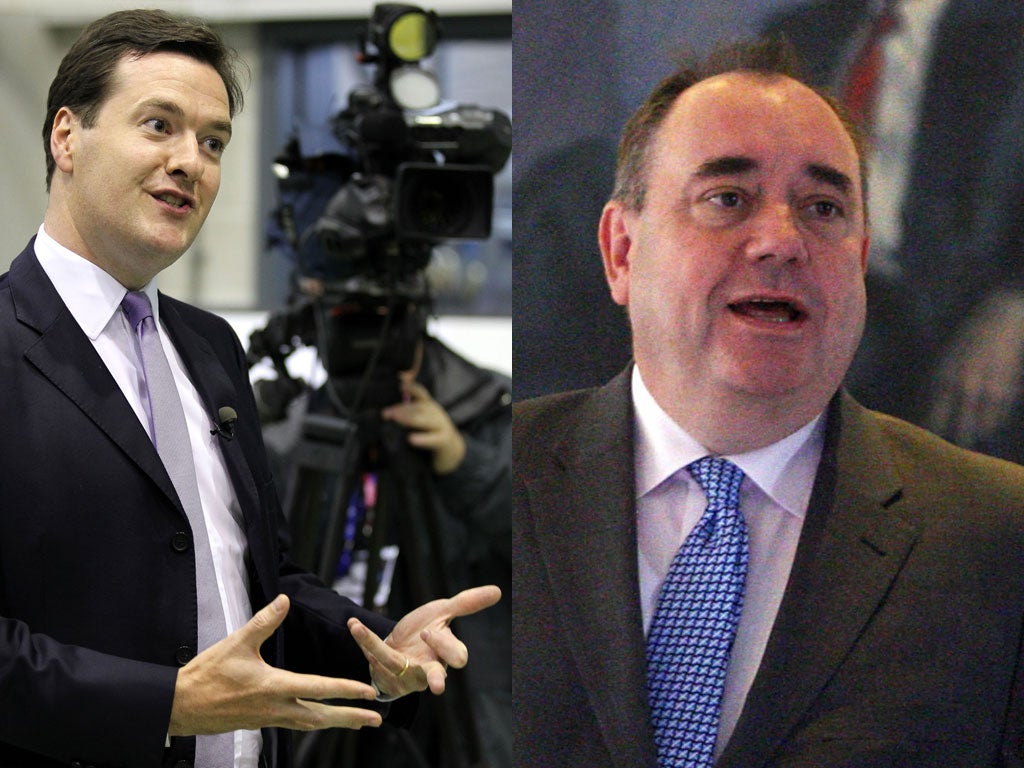George Osborne: independent Scots could lose pound
Chancellor's threat leaves Alex Salmond in a bind

Your support helps us to tell the story
From reproductive rights to climate change to Big Tech, The Independent is on the ground when the story is developing. Whether it's investigating the financials of Elon Musk's pro-Trump PAC or producing our latest documentary, 'The A Word', which shines a light on the American women fighting for reproductive rights, we know how important it is to parse out the facts from the messaging.
At such a critical moment in US history, we need reporters on the ground. Your donation allows us to keep sending journalists to speak to both sides of the story.
The Independent is trusted by Americans across the entire political spectrum. And unlike many other quality news outlets, we choose not to lock Americans out of our reporting and analysis with paywalls. We believe quality journalism should be available to everyone, paid for by those who can afford it.
Your support makes all the difference.George Osborne has given the clearest indication yet that an English government might not support an independent Scotland in keeping the pound.
In a provocative speech to business leaders in Glasgow last night, the Chancellor said the lesson of the eurozone crisis was that it was not possible to have currency union without full political union. But he said he backed plans for a Scottish referendum on independence – if only to end "the uncertainty that is disruptive for UK and Scottish business alike".
Mr Osborne's remarks represent the starkest threat yet to Scottish voters on the consequences of a Yes vote to independence. He has previously said that an independent Scotland might join the euro – but has never suggested it would not be able to keep the pound. However, his words are likely to be seized upon by nationalists as evidence of bullying tactics by Conservative politicians in London, who they say are inherently hostile to an independent Scotland.
In his speech to the CBI, Mr Osborne said the UK's single currency had "supported more than three centuries of economic and social integration". But he added: "The conundrum of the eurozone crisis is how difficult it is to combine currency union with full fiscal and political independence.
"The members of the eurozone are now faced with what I've described as the 'remorseless logic' – the very lesson of the eurozone crisis – that you can't have monetary union without greater fiscal and political integration."
Mr Osborne suggested that the Scottish Government's position – that an independent Scotland would seek to enter a formal monetary union within a sterling zone – might not be practical. "It's difficult to argue for establishing a monetary union while pursuing fiscal and political separation," he said. "In a world in which a separate, independent Scotland wished to pursue divergent economic policies, what mechanism could there be for the Bank of England to set monetary policy, as it does now, to suit conditions in both Scotland and the rest of the UK?
"As Chancellor of the Exchequer, I have seen no such credible mechanisms proposed by those advocating independence. He added: "I am not clear they exist." Before the eurozone crisis, Mr Salmond said that an independent Scotland would join the single currency, but has since modified his position to suggest that an independent Scotland would keep the pound. But it is far from clear who, if anyone, would need to agree such a monetary union – an English, Welsh and Northern Irish Parliament in Westminster, or the Bank of England?
It would be possible for an independent Scotland to peg its currency to the pound – but it would not have any say over interest rates or monetary policy affecting the strength of the currency. Even joining the euro would need the approval of all the other member states.
Mr Osborne said that support for a Scottish referendum "should not be misinterpreted as indifference about the outcome".
Q&A: Scotland and sterling
Q: What would be the choices for an independent Scotland in terms of currency?
A: It could join the euro (which is obviously highly unpopular at the moment), it could create its own currency or it could stay alongside the pound in a sterling zone – which is the option favoured by the SNP.
Q: What would be the implications of Scotland becoming independent but keeping the pound?
A: Scotland would be independent politically but tied to London in fiscal terms. Interest rates for the whole of the sterling zone would be set in London, and Scotland would have no control over general monetary policy.
Q: But is it within the Chancellor's gift to bar an independent Scotland from using the pound?
A: Scottish Nationalists would argue that it is not within the Chancellor's remit at all. It may be up to the Bank of England, but probably not a Chancellor of the Exchequer.
Q: So why is George Osborne doing this?
A: To show the SNP that it cannot have everything its own way and he is prepared to fight back hard in the battle over Scottish independence.
Q: Is that all?
A: No, he believes – as do many unionists – that the SNP is vulnerable on the whole issue of the currency. For a long time, Alex Salmond has based his arguments for Scottish independence on the premise that Scotland would keep the pound. Mr Osborne believes that, if he can sow seeds of doubt over this, he may be able to undermine the foundations of Mr Salmond's whole argument.
Join our commenting forum
Join thought-provoking conversations, follow other Independent readers and see their replies
Comments